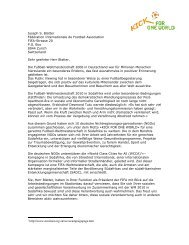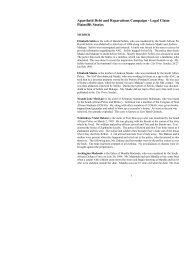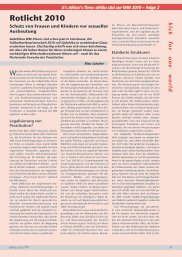Wasser – ein globales Gut - Koordination Südliches Afrika
Wasser – ein globales Gut - Koordination Südliches Afrika
Wasser – ein globales Gut - Koordination Südliches Afrika
Erfolgreiche ePaper selbst erstellen
Machen Sie aus Ihren PDF Publikationen ein blätterbares Flipbook mit unserer einzigartigen Google optimierten e-Paper Software.
Unterrichts<strong>ein</strong>heit IIII<br />
☞ MIII <strong>–</strong> 5b<br />
The Poor as Customers?<br />
Does it work?<br />
65<br />
(…)<br />
4.6 Conclusion<br />
Poor regulatory capacity has certainly contributed<br />
to a crisis in the governance regime of<br />
the concession. The problems facing the concession,<br />
however, are rooted in the myths of<br />
whatmarket oriented service delivery solutions<br />
purport to offer. First, local authorities are<br />
drawn to the conceptual idea of concessions<br />
because of the promise that the private sector<br />
will take the commercial risk through its fi nancial<br />
investment. In practice, however, the local authority<br />
is not immune from bearing the fi nancial<br />
burden of these commercial risks should the<br />
conditions of the service delivery agreement<br />
no longer be favourable to the concessionaire.<br />
The introduction of a concession in a fl edgling<br />
democracy undermines the building of an already<br />
weak local authority. (…)<br />
The lessons learnt in this process to date<br />
have taught both the concessionaire and the<br />
local authority that technical solutions do not<br />
solve the political problems of poverty. The<br />
payment for services is not simply a technical<br />
matter of getting clear bills out to service users<br />
and establishing kiosks for customer care within<br />
township areas. The payment for services is a<br />
political issue when it comes to poor people’s<br />
ability to pay. The history of apartheid and<br />
the historically abysmal context of service<br />
delivery to townships matter in shaping an<br />
understanding of how to resolve the nonpayment<br />
problem. A starting point is to involve<br />
communities more widely in the service delivery<br />
process so that they can better understand how<br />
service delivery works, what it means to be a<br />
responsible ‘customer’ and how to hold their<br />
provider accountable. These steps are part of<br />
democratising service delivery and must be<br />
steered by the local authority and its political<br />
representatives.<br />
A concession claims to be a useful service<br />
delivery alternative in offering much needed<br />
fi nancial services and technical expertise but not<br />
if is at the cost of eroding the governance of the<br />
local authority and undermining the ability of<br />
low income communities to access water.<br />
Here is where the concession presents a<br />
paradox as a service delivery model. As a service<br />
delivery model set out to meet the needs of the<br />
poor, the logic of profi t and effi ciency that drive<br />
the management of concessions does not lend<br />
itself to the patience and fl exibility required to<br />
deliver services to poor people. Furthermore,<br />
the management style of concessions is to<br />
concentrate power and the decision making<br />
processes of water distribution into a ring fenced<br />
business unit <strong>–</strong> a trend that moves counter to<br />
the democratisation processes that are vital if<br />
services are to be delivered in a socially just<br />
manner. In appraising whether the concession<br />
was the appropriate service delivery model for<br />
Nelspruit, the evidence suggests that this model<br />
is not suitable for the delivery of an essential<br />
service like water in areas with high levels of<br />
poverty.<br />
(From: Dr. Laïla Smith, Testing the limits of<br />
market-based solutions to the delivery of essential<br />
services: the Nelspruit Water Conces sion, Centre for<br />
Policy Studies, Johannesburg 2003).<br />
Aufgaben<br />
Bitte lesen Sie den Text, ohne jedes Wort zu<br />
übersetzen. Versuchen Sie den Sinn zu verstehen<br />
und beantworten Sie kurz folgende Fragen:<br />
1. Nennen Sie bitte drei Gründe für das<br />
Scheitern der Privatisierung.<br />
2. Welche Auswirkungen hat die Privatisierung<br />
auf die Demokratisierung?<br />
3. Welches Paradox b<strong>ein</strong>haltet die Privatisierung?<br />
4. Wie lautet die abschließende<br />
Schlussfolgerung?









